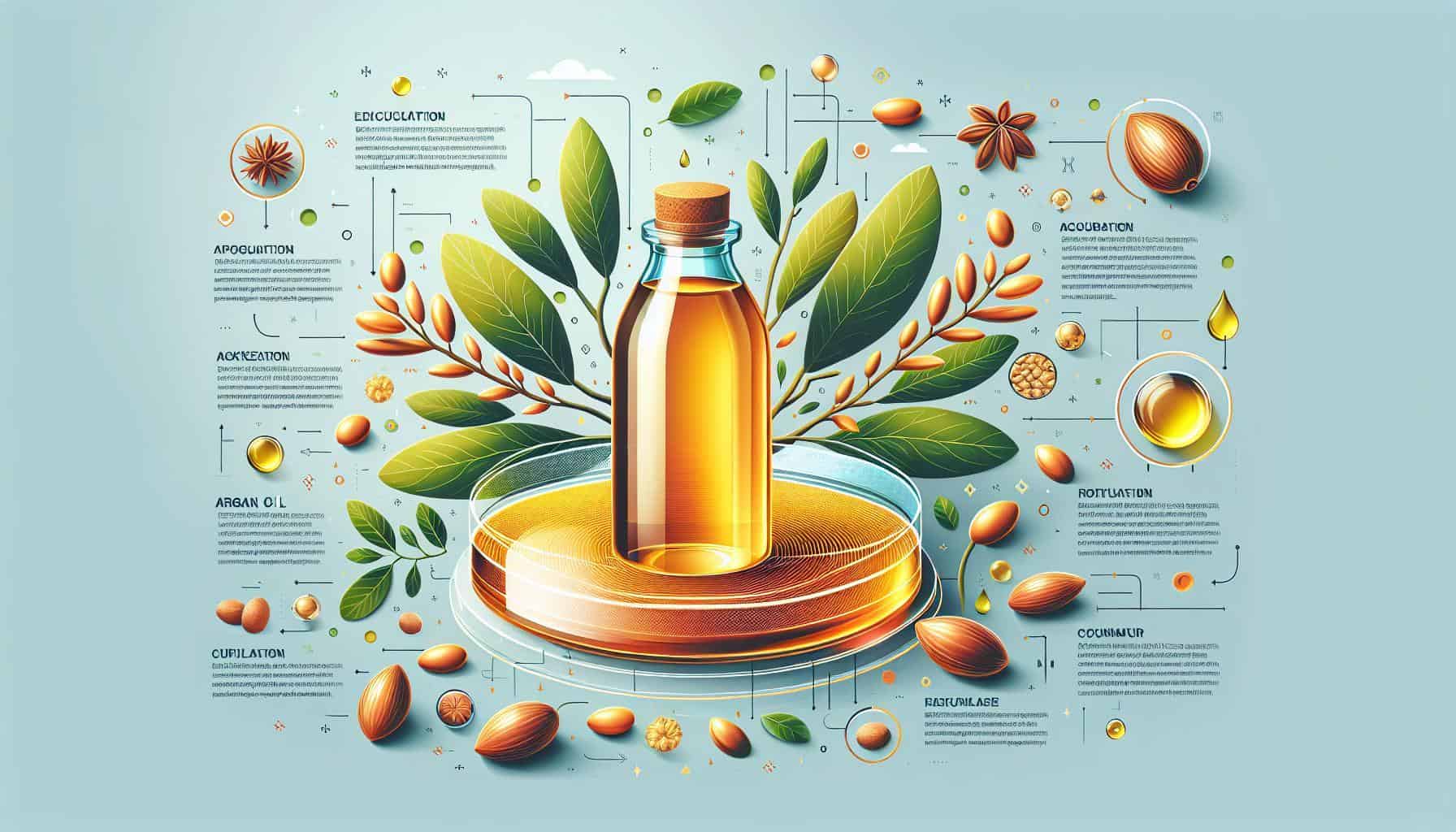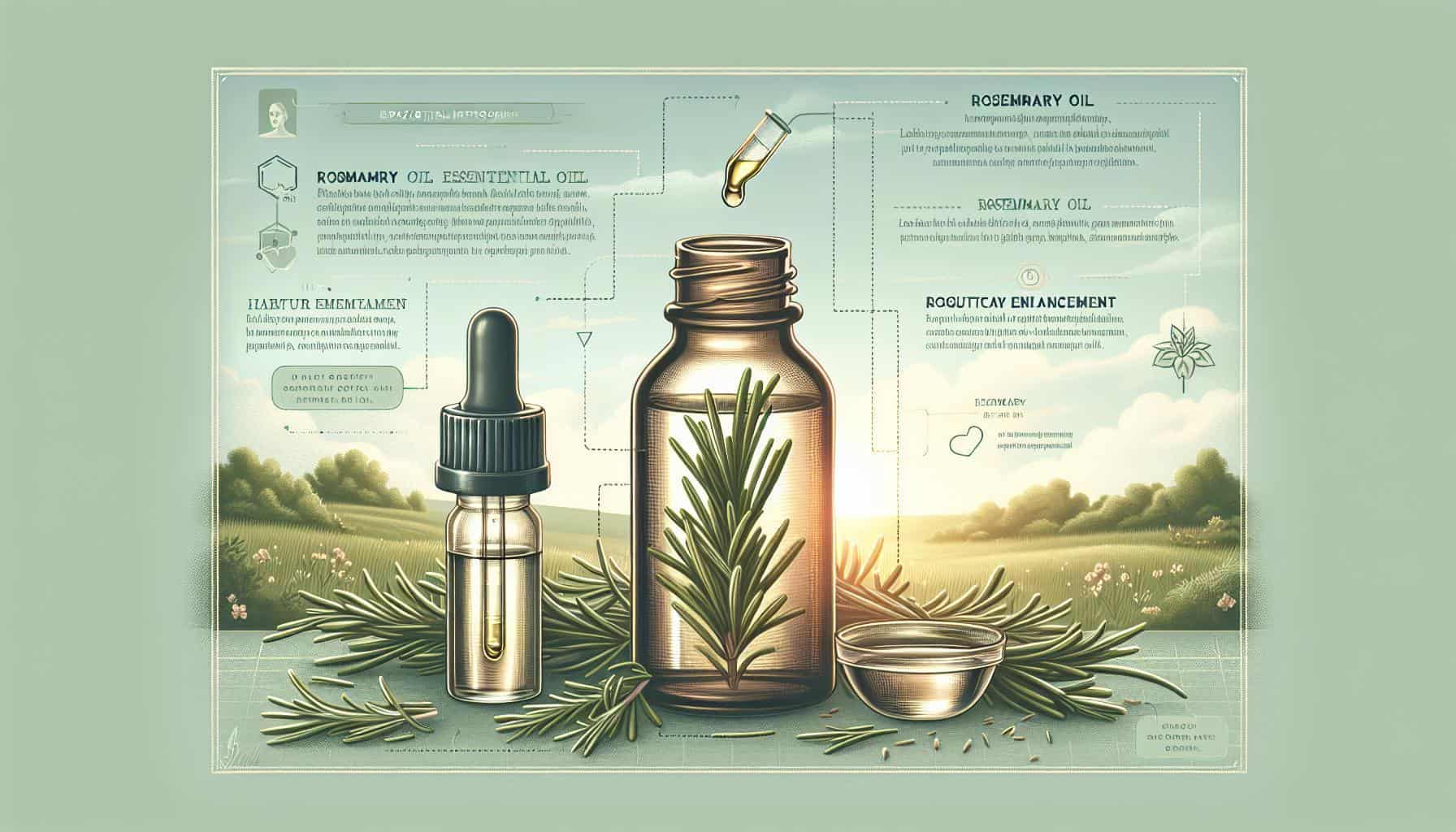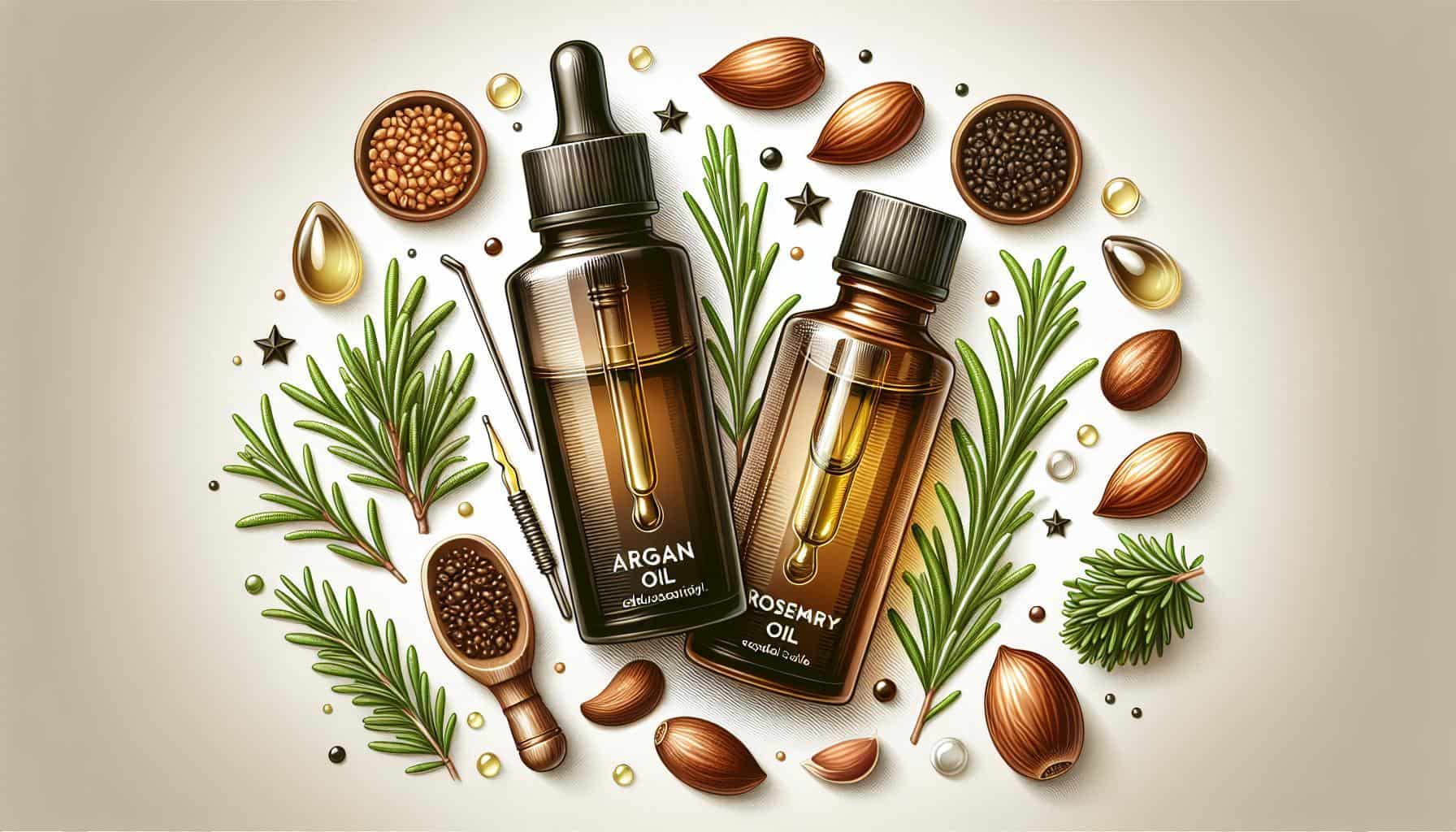Argan Oil vs Rosemary Oil: Best 2024 Pick for Hair & Skin Care
When it comes to nourishing your hair, choosing the right oil can make all the difference. Argan oil and rosemary oil are two powerhouses in the realm of hair care, each boasting unique benefits that cater to different needs. But when pitted against each other, which one comes out on top?
Argan oil, often hailed as ‘liquid gold’, is renowned for its moisturizing properties, while rosemary oil is celebrated for promoting hair growth and improving scalp health. As you navigate through the argan oil vs rosemary oil debate, you’ll discover how these oils can transform your hair care routine, offering solutions tailored to your specific hair concerns.
Argan Oil vs Rosemary Oil
When deliberating between Argan Oil vs Rosemary Oil for hair care, it’s crucial to understand the unique benefits each brings to the table. Your hair goals play a significant role in deciding which oil will suit your needs best.
Argan oil, often referred to as ‘liquid gold’, is renowned for its moisturizing properties. It’s packed with fatty acids and vitamin E, which work together to hydrate and nourish your hair and scalp. This makes it an excellent choice for those struggling with dry, brittle hair. The oil’s lightweight nature ensures that it moisturizes without weighing down your hair, promoting a healthy, glossy finish. For a deeper dive into argan oil’s benefits, check out this informative article.
On the other hand, rosemary oil is a powerhouse for promoting hair growth and improving scalp health. Its ability to improve blood circulation to the scalp is a game-changer for those looking to enhance hair thickness and growth. The oil not only has antiseptic and anti-inflammatory properties but also natural DHT blocking abilities, making it a formidable opponent against hair loss. Incorporating rosemary oil into your routine can be as simple as mixing it with a carrier oil like grapeseed or coconut oil for direct scalp application. More on this can be found here.
Finding Your Perfect Match
Choosing between argan oil and rosemary oil ultimately depends on what your hair needs most. If moisture and shine are what you’re after, argan oil might be your best bet. Meanwhile, if you’re aiming to boost hair growth and tackle scalp issues, rosemary oil could be more up your alley.
For those intrigued by the benefits of both oils, why not combine them? A concoction of argan and rosemary oil can provide the ultimate hair care treatment, addressing hydration, shine, growth, and scalp health simultaneously. It’s like getting the best of both worlds.
Benefits of Argan Oil
 When exploring the argan oil vs rosemary oil debate for your beauty regimen, it’s crucial to understand the distinct advantages each oil offers. Argan oil, often hailed as ‘liquid gold,’ is renowned for its myriad benefits, especially in skincare and haircare. Here, we delve into why argan oil might just become your go-to beauty elixir.
When exploring the argan oil vs rosemary oil debate for your beauty regimen, it’s crucial to understand the distinct advantages each oil offers. Argan oil, often hailed as ‘liquid gold,’ is renowned for its myriad benefits, especially in skincare and haircare. Here, we delve into why argan oil might just become your go-to beauty elixir.
Hydrates and Moisturizes the Skin
One of the most celebrated qualities of argan oil is its ability to deeply hydrate and moisturize the skin. This is due to its high content of fatty acids and vitamin E, which not only nourish the skin but also lock in moisture, preventing dryness. Whether you’re facing harsh winters or drying indoor heating, incorporating argan oil into your skincare routine can be a game-changer. It’s versatile enough to be used directly on your skin or mixed into your favorite moisturizer for an extra hydration boost.
For an in-depth look at the moisturizing properties of argan oil, check out this article from Healthlinehere.
Reduces Signs of Aging
Argan oil is not just a hydrating wonder; it also possesses potent anti-aging properties. The antioxidants in argan oil, particularly vitamin E, combat free radicals that contribute to signs of aging. By promoting cell regeneration and improving skin elasticity, argan oil helps minimize fine lines and wrinkles, giving your skin a more youthful appearance.
Furthermore, the soothing effect of argan oil makes it excellent for reducing the visibility of age spots and other skin imperfections. Its ability to repair and protect the skin barrier enhances overall skin health, leading to a visibly smoother and radiant complexion.
Explore how argan oil combats aging by checking out insights from Dermstorehere.
In your journey to enhance your beauty routine, considering argan oil vs rosemary oil is essential. While both oils offer unique benefits, argan oil’s hydrating and anti-aging properties make it a must-have for anyone looking to nurture and revitalize their skin. Discover more about incorporating argan oil into your skincare regime by visiting Byrdie‘s guide here.
As you continue to explore these natural oils, remember that the key to unlocking their full potential lies in understanding and catering to your specific skin needs.
Benefits of Rosemary Oil
 Diving deeper into the argan oil vs rosemary oil debate, it’s crucial to explore the distinct advantages that rosemary oil brings to the table, especially when it comes to enhancing your hair health and cognitive function.
Diving deeper into the argan oil vs rosemary oil debate, it’s crucial to explore the distinct advantages that rosemary oil brings to the table, especially when it comes to enhancing your hair health and cognitive function.
Promotes Hair Growth
If you’re on the hunt for a natural solution to boost hair growth, rosemary oil could be your hero ingredient. Its ability to stimulate the scalp and improve hair thickness is well-documented, making it a staple in the hair care community for those struggling with thinning hair. By increasing blood circulation in the scalp, rosemary oil nourishes hair follicles, potentially leading to denser, fuller locks over time.
Furthermore, its antiseptic and anti-inflammatory properties contribute to a healthier scalp environment, crucial for optimal hair growth. Studies have also highlighted rosemary oil’s capability to block DHT (dihydrotestosterone), a hormone known to play a role in hair loss, further cementing its position as a powerful ally against hair thinning (Source 1).
How to use: Massaging diluted rosemary oil into your scalp regularly can kickstart the benefits, enhancing both hair growth and health. For those seeking convenience, incorporating products enriched with rosemary oil into your routine is another effective path (Aveda).
Improves Memory and Concentration
Not just a boon for your hair, rosemary oil has also been traditionally used to boost memory and concentration. Its aromatic compounds are believed to have cognitive-enhancing properties, making it a popular choice among students and professionals alike seeking to improve their focus and productivity.
Inhaling rosemary oil can lead to an immediate positive effect on mood and performance, as suggested by various studies. One particular research found that exposure to the aroma of rosemary oil could potentially increase memory recall and alertness, underscoring its viability as a natural, cognitive booster (Source 2).
Application tips: Utilizing a diffuser to disperse rosemary oil’s essence throughout your workspace or study area is a simple and effective way to harness its memory-enhancing benefits. Alternatively, applying a drop or two to your wrists or a handkerchief for periodic inhalation can serve as a quick mental refresh throughout the day.
Different Uses of Argan Oil
When diving into the argan oil vs rosemary oil debate, it’s crucial not only to understand their benefits but also to learn about their diverse uses. Here, we’ll explore argan oil, a powerhouse in both skincare and haircare realms.
Face Moisturizer
Argan oil is celebrated for its nourishing properties, making it an exceptional choice for a face moisturizer. Rich in vitamin E and essential fatty acids, it hydrates the skin deeply without leaving a greasy residue. When you apply a few drops of argan oil to your face, the oil effortlessly penetrates the skin, offering hydration and a boost of antioxidants. These antioxidants help protect against environmental damage and can minimize the signs of aging.
What truly sets argan oil apart in the argan oil vs rosemary oil comparison for skin care is its ability to regulate sebum production, making it suitable for both dry and oily skin types. It’s fascinating how this natural oil can bring balance, promoting a clearer, more radiant complexion.
For further reading on argan oil as a moisturizer, you might find this source insightful.
Hair Conditioner
Beyond its efficacy as a skin moisturizer, argan oil shines as a hair conditioner. Its high concentration of fatty acids and vitamin E work miracles on dry, brittle hair, restoring shine and softness with ease. The oil coats each hair strand, protecting it from heat damage and environmental stressors, which can lead to breakage and frizz.
The versatility of argan oil is further evident when considering its benefits for scalp health. By moisturizing the scalp, argan oil can help to soothe dryness and reduce flakiness, potentially warding off dandruff. This is especially critical when comparing argan oil vs rosemary oil, where both oils offer scalp benefits, but argan oil’s hydrating properties are unmatched.
Incorporating argan oil into your hair care regimen is straightforward. You can use it as a leave-in conditioner, a styling product to tame frizz, or as a deep conditioning treatment. The result? Healthier, more luminous locks that feel as good as they look.
Dive deeper into how argan oil can transform your hair with this detailed guide.
Different Uses of Rosemary Oil
When exploring argan oil vs rosemary oil, the uses of each oil paint a vivid picture of their versatility and specialization. Delving into rosemary oil, you’ll find its uses span from enhancing hair health to being a staple in aromatherapy practices.
Scalp Treatment
Rosemary oil, with its potent properties, has carved a niche in scalp health and hair care. A 2013 study illuminated its effectiveness in promoting hair regrowth in cases of hormone-related hair loss. This is particularly compelling for those grappling with male-pattern or female-pattern baldness, suggesting rosemary oil as a natural ally in hair rejuvenation.
For optimal results in scalp treatment, integrating rosemary oil can be a game-changer. Its natural antiseptic and anti-inflammatory properties make it a formidable foe against dandruff, eczema, and psoriasis. The folklore of rosemary oil enhancing blood circulation in the scalp now finds backing in science, potentially explaining its prowess in boosting hair growth and thickness. Embracing rosemary oil as a Scalp treatment involves mixing it with a carrier oil—grapeseed or coconut—for a soothing, healing scalp massage. Here’s how to use rosemary oil for hair growth, with recommendations suggesting a twice-daily application for significant results.
Aromatherapy
Moving beyond the scalp, rosemary oil shines in the realm of aromatherapy. Its crisp, invigorating aroma offers more than just a pleasant scent; it’s a vehicle for enhancing mental clarity, reducing stress, and elevating mood. When diffused, rosemary oil’s magic unfolds, transforming your space into a sanctuary of tranquility and refreshed energy. However, caution is advised when using it around children under 6 years and pets, as it could be harmful to them.
Significantly, unlike argan oil, rosemary oil’s fragrance and properties render it unsuitable for diffusion. For those keen on harnessing the therapeutic benefits of oils in the air, rosemary oil is your go-to. Learn more about aromatherapy with rosemary oil and discover how a few drops in your diffuser can notably enhance your well-being.
Key Takeaways
- Argan Oil is Ideal for Hydration and Shine: Argan oil, rich in fatty acids and vitamin E, is perfect for those looking to restore moisture to dry, brittle hair and achieve a healthy, glossy look without weighing the hair down.
- Rosemary Oil Boosts Hair Growth and Scalp Health: Rosemary oil, known for its ability to promote hair thickness and growth, is the choice for combating hair loss thanks to its circulation-improving and DHT-blocking properties.
- Choice Depends on Hair Needs: Your decision between argan and rosemary oil should be guided by whether your primary concern is moisture and shine (argan oil) or enhancing hair growth and tackling scalp problems (rosemary oil).
- Combining Oils Offers Comprehensive Benefits: Mixing argan and rosemary oils can create a holistic hair care solution that addresses hydration, shine, growth, and scalp health simultaneously.
- Diverse Uses in Skin and Hair Care: Argan oil serves as a versatile moisturizer for both skin and hair, regulating sebum production and minimizing signs of aging, while rosemary oil is a key player in scalp treatments and improving cognitive functions through aromatherapy.
- Application Methods Vary by Oil and Need: Effective use of these oils depends on application methods tailored to the oils’ properties—argan oil can be applied directly or mixed into products, whereas rosemary oil is best used diluted in a carrier oil or diffused for aromatherapy.
Conclusion
Deciding between argan oil and rosemary oil for your hair and skin care routine doesn’t have to be a dilemma. Both oils offer unique benefits that can transform your beauty regimen. If you’re looking for deep hydration and anti-aging effects, argan oil is your go-to. On the other hand, if hair growth and scalp health are your main concerns, rosemary oil might be what you need. Remember, blending both could be the secret to unlocking the full potential of your hair and skin care, giving you the best of both worlds. Just be mindful of rosemary oil’s precautions, especially around young children and pets. Ultimately, your personal needs and preferences will guide your choice, leading to healthier hair and skin.
Which is Better for Hair and Skin Care: Squalane or Rosemary Oil?
When comparing argan oil vs squalane for hair and skin care, both have their benefits. Squalane is a lightweight and non-greasy moisturizer that helps to balance oil production and improve skin elasticity. On the other hand, rosemary oil is known for its antioxidant and antimicrobial properties, making it a great option for promoting hair growth and preventing dandruff. Ultimately, the choice between squalane and rosemary oil depends on individual skin and hair needs.
Frequently Asked Questions
What are the benefits of argan oil for hair care?
Argan oil is renowned for its moisturizing capabilities. It is rich in fatty acids and vitamin E, making it ideal for nourishing and hydrating dry, brittle hair. Its nutrients also help in reducing signs of aging.
Can rosemary oil promote hair growth?
Yes, rosemary oil is effective in promoting hair regrowth. It improves blood circulation to the scalp, which can lead to healthier hair growth. Additionally, its antiseptic and anti-inflammatory properties support scalp health.
Is it better to use argan oil or rosemary oil for hair care?
Choosing between argan oil and rosemary oil depends on your specific hair needs. Argan oil is excellent for moisturizing and nourishing hair, while rosemary oil is more targeted towards promoting hair growth and improving scalp health.
Can combining argan oil and rosemary oil be beneficial for hair?
Yes, combining argan oil and rosemary oil can provide comprehensive hair care benefits. Argan oil’s moisturizing properties can nourish the hair, while rosemary oil promotes hair growth and improves scalp health, offering a holistic approach to hair care.
Are there any precautions when using rosemary oil for hair care?
Yes, when using rosemary oil, it’s important not to diffuse it around children under 6 years and pets as it can have negative effects on them. Always dilute essential oils with a carrier oil before applying to your scalp or skin.

